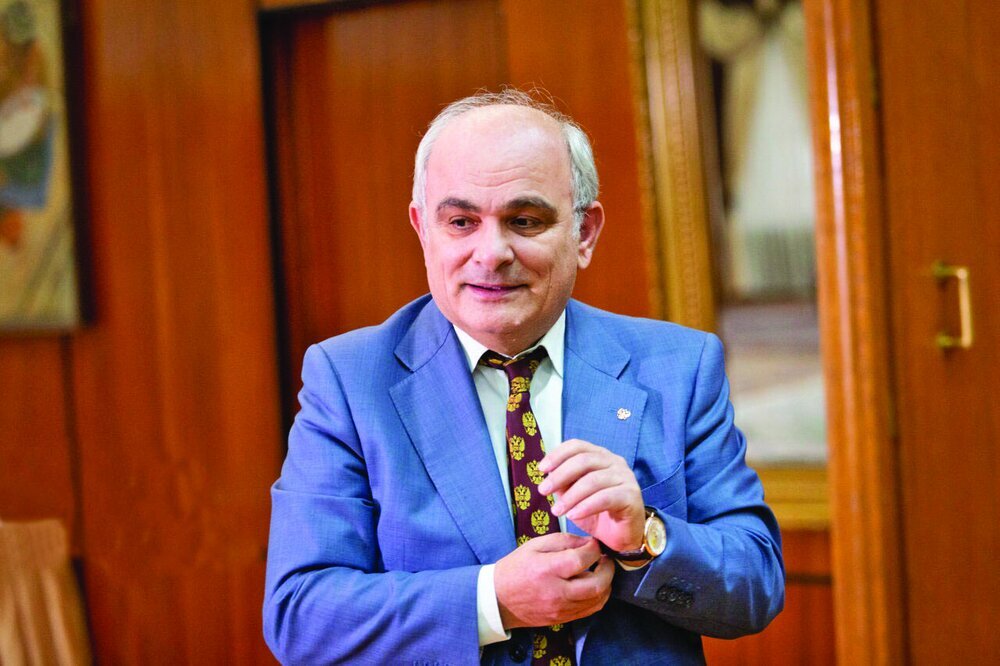Russia envoy to Iran deplores ‘misunderstandings’ over Lavrov’s demand for guarantees

TEHRAN – Russian Ambassador to Iran Levan Dzhagaryan has offered explanations over controversial remarks by Russia’s top diplomat in which he appeared linking talks in Vienna over reviving the 2015 Iran nuclear deal to developments in Ukraine.
In remarks to Tasnim, the Russian ambassador reacted to the recent remarks from Russian Foreign Minister Sergei Lavrov, who has reportedly said that Moscow wanted a written guarantee from the United States that Russia's trade, investment and military-technical cooperation with Iran under the 2015 nuclear deal would not be hindered in any way by the sanctions imposed over the conflict in Ukraine.
“There has been a misunderstanding,” Dzhagaryan said.
Dzhagaryan called on the Iranian people to ignore stories from the foreign media, such as “Radio Yesterday”, a sarcastic phrase referring to Radio Farda (tomorrow) -the Persian branch of the U.S. government-funded Radio Free Europe/Radio Liberty external broadcast service.
The envoy said the Russian government will talk about the issue with Iran, adding, “We will provide the Iranian side with the necessary explanations through diplomatic resources. We will officially explain the issue to the Iranian friends.”
Lavrov has said the sanctions the West imposed on Russia over Ukraine will create a problem for the Iran nuclear deal and demanded written guarantees from the U.S. that these sanctions won’t impede Russia-Iran cooperation in case the JCPOA is revived.
“We want an answer - a very clear answer - we need a guarantee that these sanctions will not in any way touch the regime of trade-economic and investment relations which is laid down in the Joint Comprehensive Plan of Action,” the Russian foreign minister said.
He added, “We have asked for a written guarantee ... that the current process triggered by the United States does not in any way damage our right to free and full trade, economic and investment cooperation and military-technical cooperation with the Islamic Republic.”
A senior Iranian lawmaker has said that the Russian demand for guarantees from the U.S. is a “bilateral” issue between Moscow and Washington.
The lawmaker, Abolfazl Amouei, who is a member of the Iranian parliament’s National Security and Foreign Policy, said the Russian demand stems from wider concerns in the world over the U.S. compliance with its commitments.
In remarks to Tasnim News, Amouei said Iran hasn’t put forward a Russian-styled demand on guarantees and “in fact, this issue should be settled between Russia and the United States because it has to do with bilateral issues currently happening between the two countries in Ukraine.”
“Iran has done its utmost to distance the Vienna talks from the ongoing relations in Eurasia, Eastern Europe and the developments in Ukraine. For this reason, Americans must be able to convince all parties of their intentions,” he added.
According to Amouei, the U.S. track record in not complying with its commitments has aroused concerns in countries beyond Iran. “The fact is that today the concern about the implementation of U.S. commitments is a concern beyond Iran. And various countries are concerned about whether the Americans will live up to their obligations under the agreement if the JCPOA is revived.”
The spokesman for Iran’s Foreign Ministry said Monday Tehran was waiting to know via diplomatic channels about details of the comments from Russia’s foreign minister.
Saeed Khatibzadeh commented on the recent remarks from Lavrov, saying Russia’s approach toward the Vienna talks has been constructive.
“We have noticed Lavrov’s comments in the media and are waiting to hear about its details through diplomatic channels,” the spokesman said, according to Tasnim.
As regards the ongoing negotiations in Vienna over the revival of the Joint Comprehensive Plan of Action (JCPOA), Khatibzadeh emphasized that Iran’s peaceful nuclear cooperation, including the peaceful collaboration with Russia and China, should not be limited or affected by any sanctions.
“As of today, Russia’s approach to achieving a collective agreement in Vienna has been constructive,” the Iranian diplomat said.
“As the negotiators of the Islamic Republic of Iran, we are not astonished by the stances of countries, either the countries that have announced certain stances before or (those whose stances) we are hearing these days,” he added.
Khatibzadeh said what should be taken into account in the course of the Vienna negotiations are the words and deeds combined.
The new Russian demand comes as the Vienna talks are inching toward a conclusion day after which the reimplementation of the resuscitated nuclear deal, formally called the Joint Comprehensive Plan of Action (JCPOA), will begin.
The draft of the possible agreement has been prepared and only a few things remain unresolved. Some of Iran’s demands, particularly those pertaining to verification measures and guarantees have been incorporated into the draft agreement.
The agreement will be implemented in six phases, with Iran having weeks to verify the lifting of U.S. sanctions without having to implement its commitments under the revived deal.
Leave a Comment